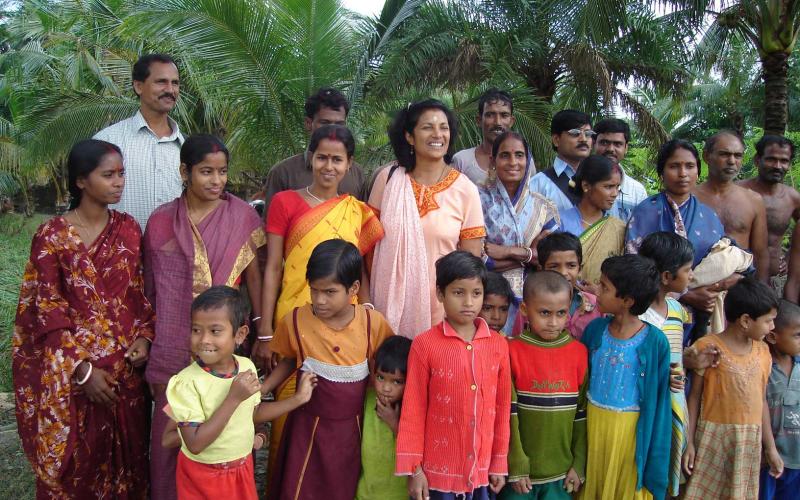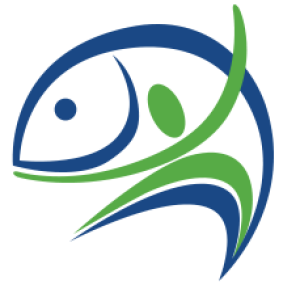
CGIAR scientist at WorldFish honored for improving the quality, quantity, and availability of food in the world thanks to her pioneering scientific work on nutrition, fish, and aquatic foods systems.
CGIAR scientist at WorldFish honored for improving the quality, quantity, and availability of food in the world thanks to her pioneering scientific work on nutrition, fish, and aquatic food systems.
11 May 2021, Penang, MALAYSIA – Dr. Shakuntala Haraksingh Thilsted, Global Lead for Nutrition and Public Health at WorldFish, was named today the 2021 World Food Prize Laureate for her groundbreaking research, critical insights, and landmark innovations in developing nutrition-sensitive approaches to aquatic food systems, including fisheries and aquaculture, and integrated food production from land and water.
Thilsted is the first woman of Asian heritage to be awarded the World Food Prize.
Often referred to as the "Nobel Prize for Food and Agriculture," the World Food Prize is the most prominent global award recognizing an individual who has enhanced human development and confronted global hunger through improving the quality, quantity, and availability of food for all.
Thilsted was the first to examine the nutritional composition of small native fish species commonly found and consumed in Bangladesh and Cambodia. Her research demonstrated that the high levels of multiple essential micronutrients and fatty acids in these affordable and locally available foods offered life-changing benefits for children's cognitive development in their first 1000 days of life and the nutrition and health of their mothers.
From this breakthrough, Thilsted went on to develop nutrition-sensitive approaches and innovations to food production from land and water that have improved the diets, nutrition, and health of millions of vulnerable women, men, and children living in low- and middle-income countries across Asia, Africa, and the Pacific.
Announcing the award during the webcast event by the World Food Prize Foundation today, U.S. Secretary of State Antony Blinken said:
"Dr. Thilsted figured out how these nutrient-rich small fish can be raised locally and inexpensively. Now, millions of low-income families across many countries, including Bangladesh, Cambodia, India, Nepal, Burma, Zambia, Malawi, are eating small fish regularly, dried and fresh, in everything from chutneys to porridge, giving kids and breastfeeding mothers key nutrients that will protect children for a lifetime. That is all thanks to her."
On being named the 2021 World Food Prize Laureate, Dr. Shakuntala Thilsted, WorldFish Global Lead for Nutrition and Public Health and Vice-Chair of the U.N. Food Systems Summit 2021 Action Track 4: Advance Equitable Livelihoods, said:
"I am truly honored to receive this award. I feel humbled to be placed in such distinguished ranks of past laureates. As a scientist, I feel this award is an important recognition of the essential but often overlooked role of fish and aquatic food systems in agricultural research for development. This award is a major acknowledgment of the urgent need to prioritize fish and aquatic foods in nutrition policies and program interventions at national and global levels. Aquatic foods offer life-changing opportunities for millions of vulnerable women, children, and men to be healthy and well-nourished. It is also an important acknowledgment for the insights, voices, and perspectives of millions of people from low-and middle-income countries. These are crucial to shaping the global discourse on nutrition and public health, as well as our shared call to action for a sustainable food systems transformation towards healthier and resilient diets that work for people and the planet."
A true food systems thinker with many research innovations under her belt, the impact of Thilsted's research crosses over different disciplines and sectors.
For example, Thilsted is credited with developing the pond polyculture system, a cost-effective and environmentally sustainable way of farming small and large fish species together in homestead ponds, water bodies, and rice fields. This innovation which helped to significantly increase the quality, diversity, and quantity of available food in many local communities, prompted a large-scale shift towards aquaculture production in Bangladesh. In addition, it led the Government of Bangladesh to recognize the pond polyculture system as a critical innovation for meeting national targets to beat hunger, malnutrition, gender inequality, and poverty.
Working together with local communities and private sector actors, Thilsted guided the development of innovative, affordable,and culturally acceptable fish-based products suitable for consumption by young children and lactating women. She discovered these products were nutrition powerhouses in their own right, and – when consumed with other foods – they also helped increase the absorption or bioavailability of other essential micronutrients found in vegetables and rice, such as iron and zinc.
Thilsted's other influential research work on harvesting and processing in fish and aquatic food systems have enabled women in the sector to overcome gender barriers, to increase the visibility of their work in and contributions to the aquatic foods sector, to improve their access to affordable, nutritious fish and other foods, to increase incomes and to create new business and economic opportunities.
In addition, her work has guided the development of national campaigns and community programs to raise awareness and improve knowledge about nutrition and the critical inclusion of fish and aquatic foods in healthy and balanced diets for malnourished women and children. Furthermore, university curricula across many low- and middle-income countries reflect Thilsted's work on nutrition, fish, and aquatic food systems, inspiring a new generation of young scientists, food systems thinkers, and nutrition and aquatic foods champions.
WorldFish's Director-General Gareth Johnstone said:
"This is a much-deserved award for a world-class food systems thinker. Dr. Thilsted's work on nutrition, fish, and aquatic foods challenges us to think very critically about the scope of agricultural research and the urgent call to action to transform global food systems towards healthy and sustainable diets for all. Traditionally, agricultural research, nutrition policies, and development interventions have predominantly focused on staple crops and livestock. They are also informed by narratives and contexts in the Global North. However, Thilsted's trailblazing work on nutrition in Asia and Africa shows that fish and aquatic food systems are an integral part of food production, local diets, culture, child and maternal health, and general wellbeing. Therefore, fish and aquatic foods must occupy a more central role in future nutrition-focused interventions and policy and investment decisions for agricultural research and development that consider the need for a holistic and sustainable transformation of all food systems in land and water.”
From the research field to the highest level of policy, the impressive body of Thilsted's scientific work and innovations is helping to shift global narratives of food production to higher food systems thinking, from the discourse on 'feeding' a growing global population to 'nourishing' billions of people, nations and the planet. Her nutrition-sensitive approaches to food production from land and water have put nutrition and public health outcomes at the forefront, with due consideration for equal access to and affordability of diverse nutritious foods for all and environmental health and sustainability.
Since 2010, Thilsted has worked at WorldFish, an entity of CGIAR, the world's largest research and innovation network. As the Global Lead for Nutrition and Public Health, she shaped the formulation of the new disruptive 2030 WorldFish Research and Innovation Strategy: Aquatic Foods for Healthy People and Planet, which was launched at the end of 2020.
Thilsted is part of the High-Level Panel of Experts (HLPE) on Food Security and Nutrition. She is also a U.N. Food Systems Champion and the Vice-Chair for Action Track 4: Advance Equitable Livelihoods of the upcoming 2021 U.N. Food Systems Summit.
For more information on her work, biography, scientific publications, please visit the link here.
##
NOTES TO EDITOR
Images and social media kit:
https://drive.google.com/drive/folders/1oOpjNeHIjgXEzzUS6gc4bpJh8fprOpp…
Media Contacts:
Donna Bowater
Senior Associate, Marchmont Communications
Email: donna@marchmontcomms.com
and
Tana Lala-Pritchard
WorldFish Director of Strategy, Innovation, and Communications Email: t.lala-pritchard@cgiar.org
and
Matthew O'Leary
WorldFish Outreach and Strategic Communications Specialist Email: m.oleary@cgiar.org
ABOUT WorldFish
WorldFish is an international, nonprofit research and innovation institution that creates, advances, and translates aquatic food systems science into scalable solutions. We vision an inclusive world of healthy, well-nourished people and a sustainable blue planet, now and in the future. Our mission is to end hunger
and advance progress on the 2030 Sustainable Development Goals through science and innovation to transform food, land, and water systems with aquatic foods for healthier people and the planet.
For over 45-years, WorldFish's data, evidence, and insights have shaped practices, policies, and investments to end hunger and advance sustainable development in low- and middle-income countries. We have a global presence across 20 countries in Asia, Africa, and the Pacific, with 460 staff of 30 nationalities deployed where the most significant sustainable development challenges can be addressed through holistic aquatic food systems solutions. Embedded in local, national, and international partnerships, our work sets agendas, builds capacities, and supports decision-making for climate action, food and nutrition security, sustainable fisheries and aquaculture, blue economy, OneHealth, and AgriTech, integrating gender, youth, and social inclusion.
A core element of the 2030 WorldFish Research and Innovation Strategy: Aquatic Foods for Healthy People and Planet is focused on building the resilience of aquatic food systems to shocks, which is critical to COVID-19 response and recovery.
WorldFish is part of CGIAR, the world's largest agricultural research and innovation network. For more information, please visit https://www.worldfishcenter.org.
ABOUT THE WORLD FOOD PRIZE
The World Food Prize Foundation elevates innovations and inspires action to sustainably increase the quality, quantity and availability of food for all. The Foundation supports this through a variety of innovative programs year-round including by: recognizing and rewarding individuals making exceptional achievements in addressing food security; convening global leaders in Des Moines each year to address the latest issues and innovations in food and agriculture; inspiring, recognizing and empowering students around the world by providing educational and professional experiences on pressing food security and agriculture issues; and addressing Iowa's challenges and successes in fighting hunger and poverty.
A Selection Committee of experts from around the world oversees the nomination and selection process and is chaired by Dr. Gebisa Ejeta. Other past Prize Laureates include former President of Ghana John Kufour; U.S. Senators Bob Dole and George McGovern; Nobel Peace Prize Laureate Dr. Muhammad Yunus; Professor Yuan Longping and former Executive Director of the United Nations World Food Programme Catherine Bertini.
ABOUT CGIAR
CGIAR is the world’s largest global agricultural innovation network. We provide evidence to policy makers, innovation to partners, and new tools to harness the economic, environmental and nutritional power of agriculture.
CGIAR has a wealth of experience and knowledge spanning 50 years that builds on a track-record of innovation and world-class research. Thanks to our funders, CGIAR research has transformed the lives of hundreds of millions of people through tangible research outcomes.
The 13 CGIAR Research Centers are independent, non-profit research organizations, conducting innovative research. Home to more than 8,000 scientists, researchers, technicians, and staff, CGIAR research works to create a better future for the world’s poor. Each Center has its own charter, board of trustees, director general, and staff. CGIAR Research Centers are responsible for hands-on research programs and operations guided by policies and research directions set by the System Management Board.
